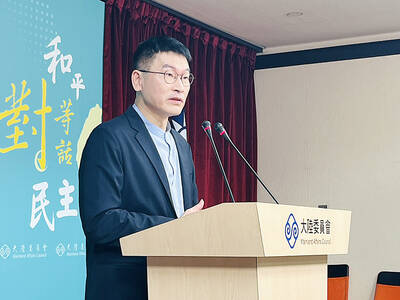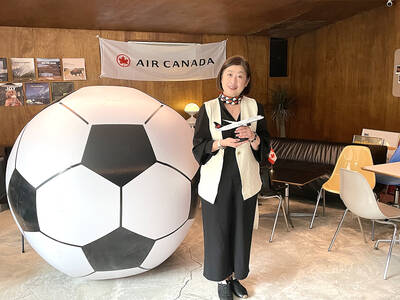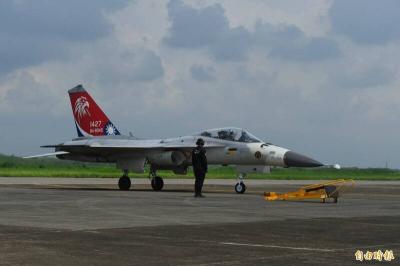A day after confirming that the government was trying to devise means to ensure that schools offering Chinese-language classes to foreigners were properly regulated, officials yesterday were unable to provide specific details about which schools, if any, might be affected.
They were also unable to specify which criteria would be used to ensure schools met applicable regulations.
Ministry of Education (MOE) officials also said that the "list" of ministry-approved schools it submitted to the Ministry of Foreign Affairs did not include non-university affiliated language institutes, because these schools did not fall under the responsibility of the ministry.
Such schools fall under the responsibility of local governments.
Officials said that the ministry hoped to establish criteria to regulate language schools in discussions with the Taipei City Government's education department and the ministry's department of social education before a final decision is made at the end of March.
"There is evidently a lack of communication between government agencies, and we hope to work together to better regulate these schools," said an official surnamed Chen. "It is an ongoing process."
Government officials in Taiwan who are not official spokespeople often ask to be identified only by their surnames.
Education ministry officials said that outdated social-education regulations stipulated that language centers and cram schools could be set up to educate Taiwanese nationals.
Technically, language schools, even large, well-established ones such as the Taipei Language Institute (TLI), fall outside of legal requirements because they teach foreign students, officials said.
The education ministry has therefore been trying to work with TLI and other schools to make adjustments to abide by the current legal requirements as best as possible, officials added.
Meanwhile, a TLI official, who also asked to be identified only by her surname, Yeh, said that it would be easier for the education ministry to manage language schools if they were university-affiliated, so the ministry had said that they hoped TLI would make the necessary adjustments.
Yeh said that TLI is cooperating with a university in an effort to comply with the ministry's policy, but she would not specify which university.
TLI has already sent documents verifying the legal adjustments to the ministry, and was awaiting approval, she said.
She added that TLI was originally under the management of the education ministry, but that at some point the ministry realized that there was no law regulating language schools.
Yeh said that she was worried that unclear government policies might prompt many foreigners to choose to go to China, rather than Taiwan, to study Mandarin.
She said that the language-learning environment in Taiwan was better than in China, adding that students should not be forced to go to China because of unclear policies.
A Bureau of Consular Affairs official surnamed Chou said that the point of the government's effort was to crack down on foreigners who work illegally in the country by pretending to study Chinese.

LOW RISK: Most nations do not extradite people accused of political crimes, and the UN says extradition can only happen if the act is a crime in both countries, an official said China yesterday issued wanted notices for two Taiwanese influencers, accusing them of committing “separatist acts” by criticizing Beijing, amid broadening concerns over China’s state-directed transnational repression. The Quanzhou Public Security Bureau in a notice posted online said police are offering a reward of up to 25,000 yuan (US$3,523) for information that could contribute to the investigation or apprehension of pro-Taiwanese independence YouTuber Wen Tzu-yu (溫子渝),who is known as Pa Chiung (八炯) online, and rapper Chen Po-yuan (陳柏源). Wen and Chen are suspected of spreading content that supported secession from China, slandered Chinese policies that benefit Taiwanese and discrimination against Chinese spouses of

ALIGNED THINKING: Taiwan and Japan have a mutual interest in trade, culture and engineering, and can work together for stability, Cho Jung-tai said Taiwan and Japan are two like-minded countries willing to work together to form a “safety barrier” in the Indo-Pacific region, Premier Cho Jung-tai (卓榮泰) yesterday said at the opening ceremony of the 35th Taiwan-Japan Modern Engineering and Technology Symposium in Taipei. Taiwan and Japan are close geographically and closer emotionally, he added. Citing the overflowing of a barrier lake in the Mataian River (馬太鞍溪) in September, Cho said the submersible water level sensors given by Japan during the disaster helped Taiwan monitor the lake’s water levels more accurately. Japan also provided a lot of vaccines early in the outbreak of the COVID-19 pandemic,

PROMOTION: Travelers who want a free stopover must book their flights with designated travel agents, such as Lion Travel, Holiday Tours, Cola Tour and Life Tours Air Canada yesterday said it is offering Taiwanese travelers who are headed to North America free stopovers if they transit though airports in Japan and South Korea. The promotion was launched in response to a potential rise in demand for flights to North America in June and July next year, when the US, Canada and Mexico are scheduled to jointly host the FIFA World Cup, Air Canada said. Air Canada offers services to 13 of the 16 host cities of the tournament’s soccer games, including Toronto and Vancouver; Mexico City, Guadalajara and Monterrey in Mexico; Atlanta, Georgia; Boston; Dallas; Houston;

The US approved the possible sale to Taiwan of fighter jet spare and repair parts for US$330 million, the Pentagon said late yesterday, marking the first such potential transaction since US President Donald Trump took office in January. "The proposed sale will improve the recipient's capability to meet current and future threats by maintaining the operational readiness of the recipient's fleet of F-16, C-130," and other aircraft, the Pentagon said in a statement. Trump previously said that Chinese President Xi Jinping (習近平) has told him he would not invade Taiwan while the Republican leader is in office. The announcement of the possible arms